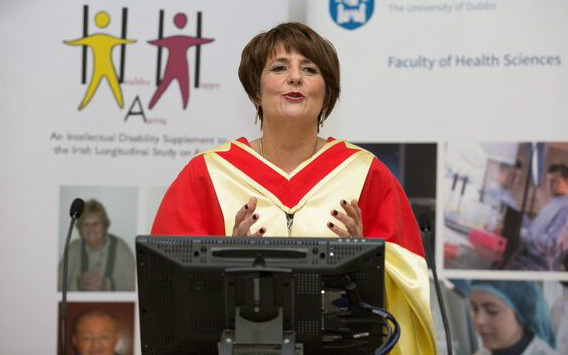‘Life Expectancy for Those With Intellectual Disability Used to be Nine Years. Today it is 50 and Beyond’
Posted on: 11 December 2015
The ageing of people with an intellectual disability is a success story that was celebrated in the inaugural lecture delivered by Professor Mary McCarron, Dean of the Faculty of Health Sciences and Trinity College Dublin’s first Professor of Ageing with Disabilities, in Trinity Biomedical Sciences Institute last night.
“This is the first time in history we have ever had a population of people with an intellectual disability who have reached old age and this is something that we should celebrate. Life expectancy for those with Down syndrome in the 1930s was nine years. Today it is 50s, 60s, 70s and beyond,” says Professor McCarron.
This success, however, is challenged by inequities in care, health and community participation experienced by people with intellectual disability (ID) as they age in Ireland. A pro-active response is required to ameliorate these inequities and to ensure full and fulfilling life opportunities for all people growing older in Ireland but in particular for people ageing from an already disadvantaged position such as those with ID.
For instance, family networks of people with ID look very different to that of the general population. Older people with ID are typically single/unmarried and without any children or grandchildren. They are often cared for by family members, who in addition have elderly parents and children to look after – creating a triple layer of care demands.

Professor McCarron has dedicated her career to highlighting and addressing these inequities. “I have selected the phrase ‘pushing the boundaries’ for this inaugural lecture as I feel we really need to raise the visibility of the needs and experiences of people with intellectual disability as they grow older,” says Professor McCarron.
Findings on the longitudinal study on ageing of people with ID (IDS-TILDA), in addition to previous longitudinal research in the field of dementia and people with Down syndrome led by Professor McCarron, show a marked increase in the prevalence of dementia for people with Down syndrome.
Insights into onset, manifestation and impact on the life experience for this cohort is valuable in its own right but also informs society’s understanding of dementia for the general population.
Through research with the population of people with ID, Professor McCarron hopes to continue to give voice to a group who have been too often silenced in the past; whose needs, desires and rights too often ignored; and their centrality and importance within our society too often missing from the national policy agenda.
Professor McCarron’s inaugural address was attended by over 200 invitees, comprising key stakeholder groups, including families with members who have an intellectual disability.
Professor McCarron is lead investigator on the Intellectual Disability Supplement to TILDA (The Irish Longitudinal Study on Ageing), the first of its kind in Europe and the only one in the world with the ability to compare the ageing of people with intellectual disability directly with the general ageing population.
- The full title of Professor McCarron’s lecture was: ‘Pushing The Boundaries: Reaching New Heights In Research On Ageing For People With An Intellectual Disability’.
About Professor McCarron:
- Professor Mary McCarron is Dean of Faculty of Health Sciences at Trinity College Dublin and an international expert in the field of ageing and intellectual disability, dementia and Down syndrome. She has been a champion for those with intellectual disability since she began her career as a nurse in the 1980s.
- She is currently leading the research team for the Intellectual Disability Supplement to the Irish Longitudinal Study on Ageing and her work also includes research on palliative care issues for people with intellectual disability and for the general population. The third wave of research for this study begins next month, January 2016.
- Professor McCarron is also a consultant to services providers and advocacy groups and has been instrumental in the design of the Daughters of Charity Disability Support Service Willow View and Meadow View House. These homes received the 2014 Specialist Care Centre of the Year and the 2014 Building Project of the Year.
- Professor McCarron and her team’s ongoing research being conducted in Trinity will provide valuable information on the health, social and economic circumstances of people with an intellectual disability in Ireland as they age. This will allow policymakers to draw on that data when determining what the needs of this group will be into the future.
- Inaugural lectures are a significant landmark in any academic’s career, providing newly appointed professors with the opportunity to showcase their research to the college community and members of the public.
Intellectual Disability Supplement to TILDA Key Findings:
- A report on Wave 2 of the Intellectual Disability Supplement to TILDA (The Irish Longitudinal Study on Ageing) was released in October 2014.
- In the three-year period since the first IDS-TILDA study was conducted (in 2010), the prevalence of dementia among people with Down syndrome almost doubled from 15.8% to 29.9%. These are much higher levels than those seen in the general population. The average age of onset of dementia for people with Down syndrome was 55 years of age, with some cases presenting in their early 40s. By comparison the majority of people with dementia in the general population are over 65 years of age.
- Rates of hypertension were more than 50% lower for people with intellectual disability (17.5%) than for the general population (37%) while myocardial infarction (heart attack) was almost three times higher among the general population (as reported by TILDA) than for people with intellectual disability.
